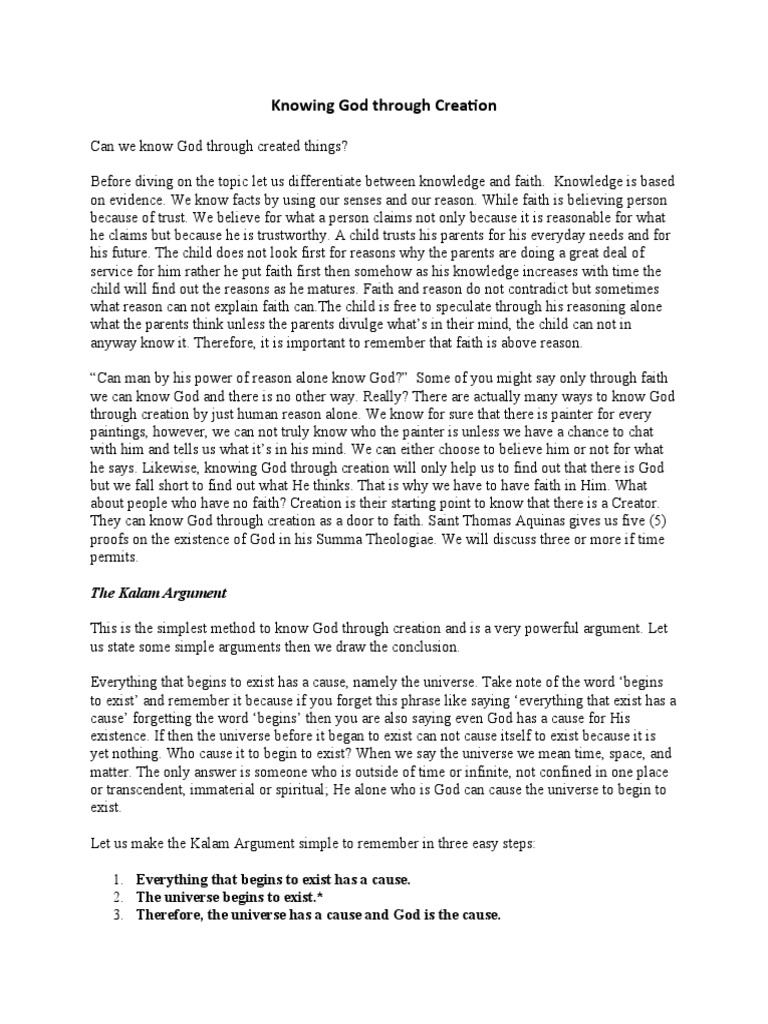The Baha’i Faith posits a rich and profound understanding of the relationship between God and His creation. Drawing from a vast reservoir of spiritual insights, Baha’is believe that knowing God is intrinsically linked to recognizing His handiwork in the universe. This perspective invites a transformative exploration of the natural world and our place within it.
A fundamental tenet of Baha’i teachings is the belief that God is both transcendent and immanent. While God exists beyond the realms of human comprehension, He also manifests in creation, allowing individuals to experience His presence through the intricacies of life. This duality encourages an enriched understanding of how to approach the divine, asserting that the wonders of the world around us are not merely coincidence but a deliberate reflection of God’s attributes. Through the lens of nature, Baha’i writings elucidate a framework for perceiving the divine.
One might begin this exploration by considering the majesty and order found within the natural world. Baha’is believe that every aspect of creation is imbued with purpose. The complexity of ecosystems, the elegance of celestial bodies, and the subtlety of human relationships serve to illustrate divine wisdom. This invites a sense of reverence; each flower that blooms, each river that flows, is a manifestation of God’s creativity, thus challenging the observant heart to perceive a deeper significance in the mundane.
The Baha’i teachings encourage individuals to reflect on their own existence as a unique part of the grand tapestry of creation. This reflection is not a soliloquy of solitude but a call to engage actively with the world. The process involves recognizing one’s own attributes mirrored in the attributes of God—qualities such as love, justice, and mercy. Such recognition not only fosters personal growth but nurtures a broader connection with humanity. This sense of interconnectedness reinforces the notion that to know oneself is, in essence, to strive to understand the divine.
Moreover, the cycle of inquiry and contemplation is pivotal within Baha’i thought. The act of questioning holds paramount importance. Baha’is are urged to seek knowledge and understanding through observation, encouraging an inquisitive spirit that extends to the nuances of the universe. This pursuit of knowledge is not limited to academic inquiry; it encompasses an experiential engagement with creation, allowing individuals to uncover the spiritual truths that reside within the empirical world.
As one delves deeper into the Baha’i perspective, the significance of human nature and its potential becomes increasingly evident. Baha’is assert that humans are endowed with the capacity to reflect the divine qualities in their actions. The teachings emphasize that every individual possesses the inherent ability to discern the light of God within all creation. This innate potential acts as a guiding light, inspiring believers to manifest virtues such as compassion, kindness, and service, thereby contributing to the collective improvement of society.
This commitment to service is an integral aspect of the Baha’i approach to knowing God through His creation. By engaging in acts of service, individuals not only express their reverence for the divine but also foster an environment where others can similarly discover the beauty in creation. This dynamic interplay between service and spirituality reinforces the idea that the understanding of God is not an isolated experience but a communal journey where everyone plays a vital role in the symphony of life.
A requisite shift in perspective occurs when individuals begin to view challenges, suffering, and adversity in the context of divine wisdom. In the Baha’i framework, the trials faced by humanity can be perceived as opportunities for growth and deeper understanding. Viewing life through this lens transforms obstacles into stepping stones toward spiritual enlightenment. This transformative perspective is essential for cultivating resilience and fortitude in the face of life’s inevitable trials.
Additionally, the Baha’i teachings maintain that the beauty of creation extends beyond the physical realm. The arts, literature, and cultural expressions are vital conduits through which individuals can perceive and reflect divine attributes. Artistic endeavors, whether they be visual, auditory, or literary, can elevate the human spirit and provide profound insights into the nature of existence. In this context, artists are seen as contributors to the divine narrative, inviting others to join in the exploration of profound truths.
The Baha’i concept of unity of religions further enriches this discourse. The recognition that various faith traditions, while diverse, ultimately lead to the same divine source encourages admirers of creation to seek out the commonalities in all beliefs. This understanding fosters an atmosphere of tolerance and respect, encouraging dialogue that transcends the superficial divisions that often separate humanity.
In conclusion, the Baha’i teachings articulate a compelling pathway for knowing God through His creation. By encouraging an active engagement with the natural world, emphasizing the importance of self-reflection, and advocating for a communal spirit of service and inquiry, the teachings invite individuals to cultivate a profound relationship with the divine. This dynamic perspective not only enhances personal spirituality but promises to inspire a collective renaissance of understanding, compassion, and unity in an ever-evolving world.
